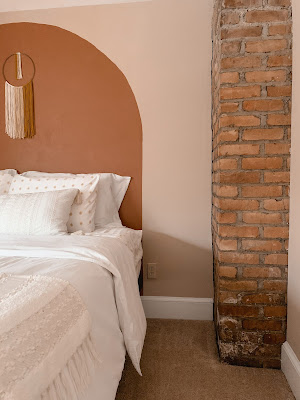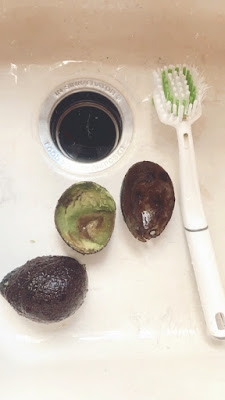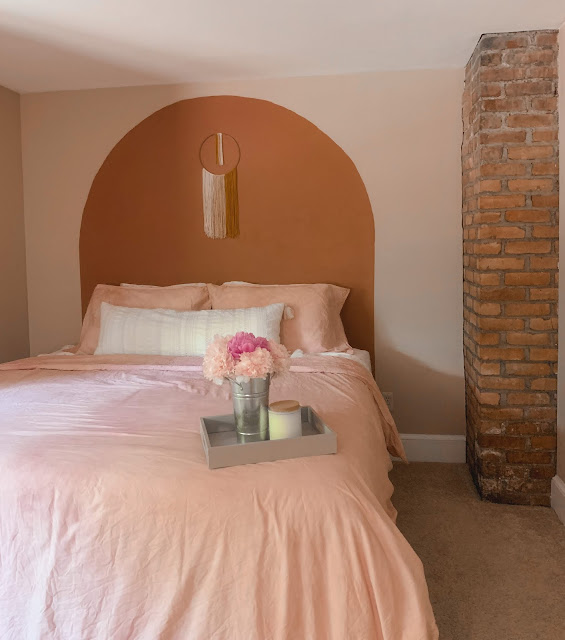How to Naturally Dye a Duvet Cover
So as much as I have loved my white duvet cover I wanted a fun change. Thanks to a friend, I was introduced to the idea of natural dyeing. I began researching and was amazed at how relatively easy and straight forward the process seemed. You can make practically any color using common every day household food items. This is a great way to color fabrics without the use of harmful dyes and chemicals. Below I've listed some basic colors you can achieve with common foods or food scraps.
Pink: red cabbage
Beets: pink
Peach: avocado pits and skins
Orange: yellow onion skins
Yellow: ground turmeric
Green: spinach
Blue: black beans
 |
| Original Source |
Without much hesitation I decided to go for it! My goal was to achieve a rust/ cinnamon color. To do so I figured I'd try mixing yellow onion skins and avocado pits. In total I used 9 avocado pits, 4 skins and yellow onion skins from a 1 lb bag of onions. Here are the supplies you will need to complete this project.
A large stock pot - I used a 5 gallon pot
Your choice of food scraps
A mordant - if applicable
You're probably wondering what the heck is a mordant? A mordant allows your dye to properly stick to your fabric. Some dyes require mordants while others do not so be sure to look into this when choosing your dye. Avocados and yellow onions do not require the use of a mordant so this was not applicable for my specific project.
So to begin cut each avocado and place the pits and skins aside. I washed each avocado pit thoroughly. This is imperative as you don't want to allow any of the green flesh to remain and potentially stain your fabric. If you choose to use the skins, I recommend using a dish brush to thoroughly scrub and clean these as well. Set these aside with the pits and peel the yellow onions. Make sure to take only the outer flaky layer of the onion.
Once prepped, place the scraps into your stock pot filling it with water 2/3rds of the way. Bring the water to a boil and then reduce the heat. Simmer for one hour. While your dye is simmering, prep your fabric by wetting it with warm water. Since my duvet cover was rather large I choose to run it through a quick cycle in the washer.
Now this is the fun part, the longer the fabric sits the darker it gets. Monitor is closely until you've achieved your desired color. I let my duvet sit for 30 hours. Some articles recommend letting it sit up to 48 hours. This is something you will need to decide. Once you've achieved your desired color remove the fabric from your pot. I did this in my bathtub as it was the only space large enough. If you are doing a smaller piece of fabric a kitchen sink would be just fine. Rinse your fabric thoroughly under cool water. This will not remove or fade color from your fabric, it is simply to remove any access dye that was not absorbed into the fabric.
Once your fabric has been rinsed, its time to dry. Due to the size of my duvet cover I choose to tumble dry however many of the articles I read recommended hang drying the item. Personally, I didn't notice any adverse effects to the tumble drying. Once fully dry it's time to show off your beautiful new piece!
 |
| Before |
I hope you guys found this helpful and enjoyed this little walk through. Please note that the color you get can be effected by many things including the pH of the water, type of fabric, type of water (ie: salt water or tap water), etc. So try to be flexible and have fun with it! Xoxo















It's an fascinating feature not only of blackjack but of all casino games that the house—or casino— always has the advantage. It's one other fascinating feature of blackjack that the dealer's bust potential is usually lower than the players'. But even for the informal participant who performs a fairly good sport, the casino 점보카지노 odds are much less, making Blackjack one of the most enticing casino games for the participant. While the recognition of Blackjack dates from World War I, its roots go back to the 1760s in France, the place it's known as Vingt-et-Un . Today, Blackjack is the one card sport that can be be} present in every American casino. As a well-liked residence sport, it's played with barely different rules.
ReplyDeleteThis is amazing!!!! I had no idea it's possible to dye something so big as a duvet cover in a stockpot!!!!!!! Thank you so much for this gorgeous blog!
ReplyDeleteI really enjoyed your detailed guide on naturally dyeing a duvet cover! It’s amazing how household items like avocado pits and onion skins can create such vibrant colors. Reading this reminded me of how important it is to also choose a good bed setup for comfort. When I recently updated my bedroom, I compared several 8 inch double bed mattress price in Pakistan to find one that was comfortable and affordable. Memory foam mattresses seem to work best for support, especially if you spend a lot of time reading or relaxing in bed. Pairing a soft, beautifully dyed duvet cover with a supportive mattress really improves the overall sleep experience and makes the bedroom feel cozy and personal.
ReplyDelete